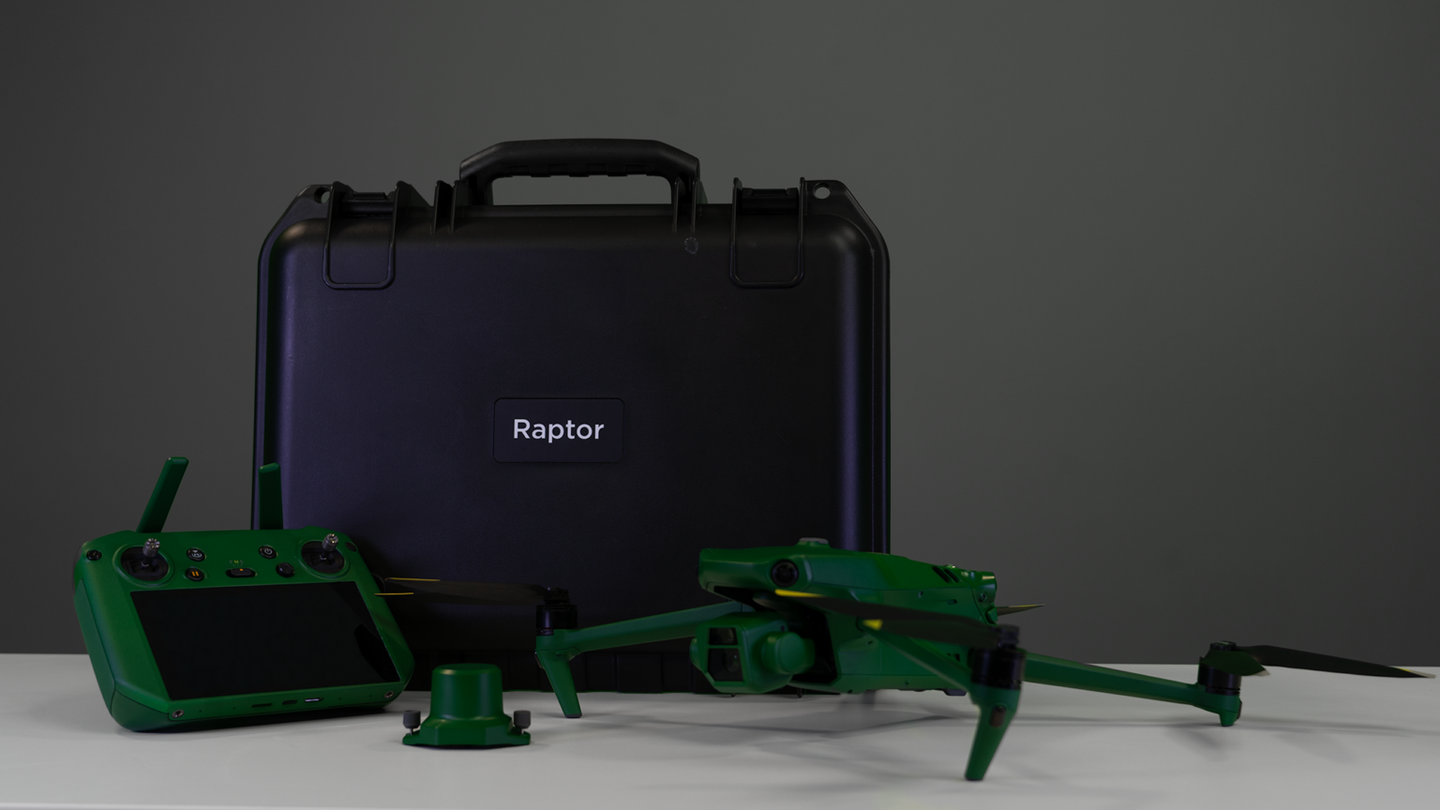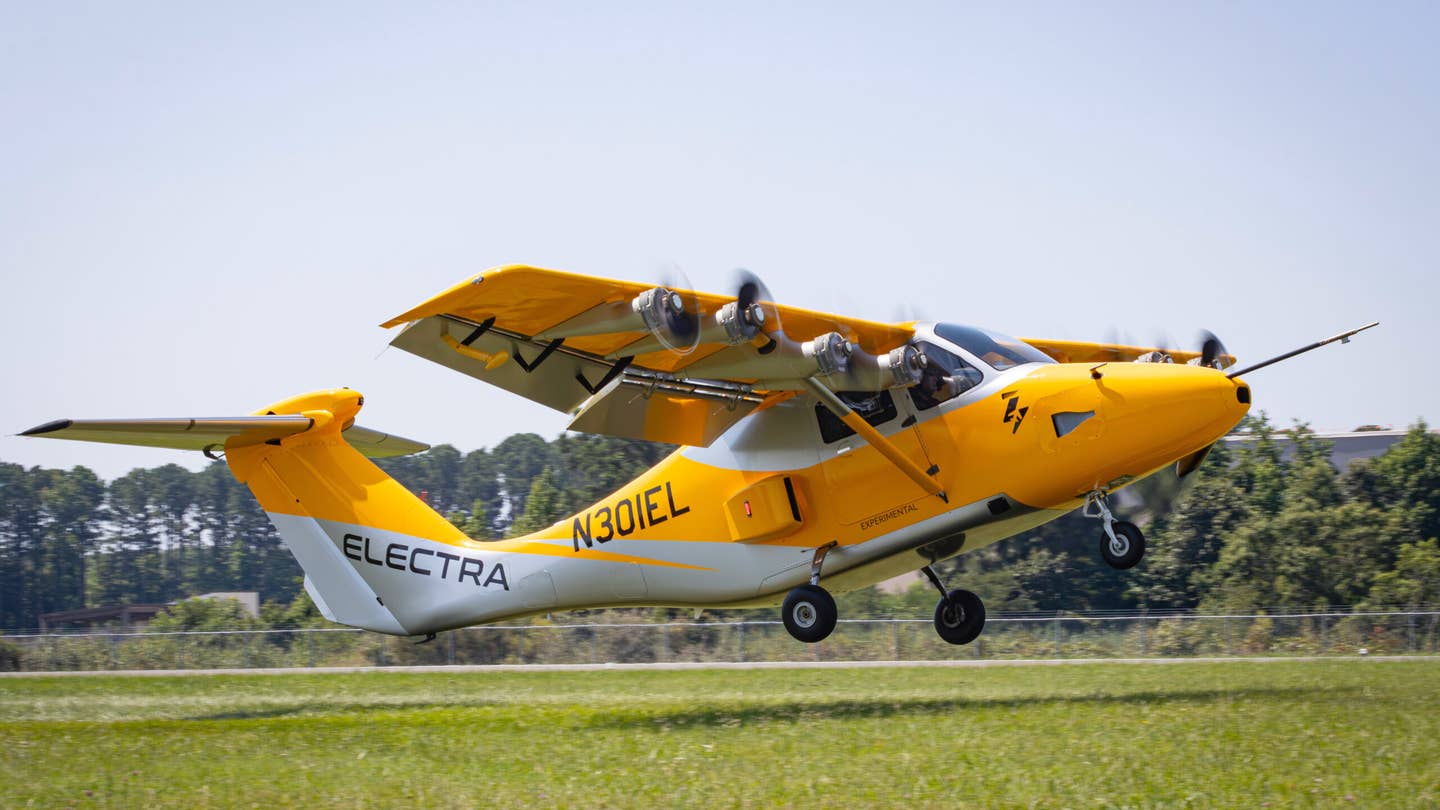Chinese Drone Clones Accused of Skating U.S. Federal Bans
According to lawmakers, China’s DJI is using other companies to sell near-identical versions of its drones, which are banned within many federal agencies.

Anzu’s Raptor drone bears all the hallmarks of DJI’s Mavic 3, save for its green paint job. [Courtesy: Anzu Robotics]
According to American lawmakers, Chinese drone manufacturers are getting creative to circumvent restrictions on the technology’s sale and use in the U.S.
On Tuesday, members of the U.S. House Select Committee on the Strategic Competition Between the United States and the Chinese Communist Party (CCP) alleged that U.S.-based Anzu Robotics and Hong Kong-based Cogito Tech are actually fronts for China’s DJI.
DJI is the world’s largest provider of consumer drones—the kind flown by hobbyists for fun or personal enjoyment. The aircraft undercut most American-built models on price and have proliferated among U.S. buyers, including police and fire departments.
“DJI appears to be using [Anzu and Cogito] as part of a concerted effort to thwart current and prospective restrictions on its operations imposed by the United States,” the lawmakers say.
Chinese drone manufacturers have been the target of sweeping bans on procurement and sale among federal agencies, including the Defense Department, Treasury Department, Commerce Department, and Department of the Interior. The FBI and Department of Homeland Security, among other entities, have warned of cybersecurity threats from DJI drones, citing the company’s obscured ties to several Chinese state-backed investors.
Lawmakers have even called the technology “TikTok with wings,” likening it to the Chinese social media app that faces allegations of spying and collecting user data without consent. A bill being deliberated by Congress, the Countering CCP Drones Act, would effectively extend federal DJI bans to the consumer level by prohibiting the drones from using Federal Communications Commission (FCC) infrastructure.
Amidst the DJI panic, Texas-based Anzu quietly registered with the FCC in December. The company’s founder and CEO, Randall Warnas, spent two years as an enterprise sales manager for DJI and was later chief executive of its competitor Autel before resigning abruptly after three months.
U.S. Representatives John Moolenaar (R-Mich.) and Raja Krishnamoorthi (D-Ill.) worry that Warnas continues to leverage those connections. In letters penned to Warnas and Secretary of Commerce Gina Raimondo, they allege Anzu’s Raptor T drone is “essentially a DJI Mavic 3 painted green, with its remote control and application all running on DJI technology.”
Warnas told FLYING: “We believe there are fundamental misunderstandings about how Anzu Robotics operates and complies with the law. We look forward to working collaboratively with the Committee to address their concerns.”
A Drone Clone?
The lawmakers cite independent research from drone reviewer Half Chrome Drones and software developer Konrad Iturbe, who documented myriad similarities between the Raptor T and DJI’s Mavic 3, including some of the same hardware. Shortly after they published their investigations, DJI revealed the companies’ partnership—which they did not disclose to the FCC—to news outlet DroneDJ.
“DJI has a business partnership with Anzu Robotics,” a company spokesperson said. “This was established with the goal of enhancing the accessibility of capable and cost-effective drones in the market. DJI had established a similar partnership in the past when it collaborated with Skycatch in 2018.”
Anzu claims it has rebuilt DJI’s software in partnership with American firm Aloft Technologies, using U.S. servers to store data. But lawmakers claim the company relies heavily on the Chinese manufacturer in that arena, too.
Moolenaar and Krishnamoorthi cite an analysis authored by Andreas Makris, CEO of German software startup ThinkAwesome, that suggests Anzu’s firmware is signed and decrypted by DJI keys, among other connections. In their view, this “strongly indicates that the Anzu firmware was directly sourced from DJI.”
“The Anzu Raptor is just a green DJI Mavic 3 Enterprise, without any substantial own development,” Makris concludes.
His analysis also found that Raptor’s remote controller “seems to be a relabeled DJI RC Pro.” It has identical firmware but uses a different app, Aloft ai, that runs on DJI’s software.
“The software provided to Anzu Robotics is our Software Development Kit (SDK), which is publicly accessible on the internet for any developers within the drone ecosystem to utilize for free,” a DJI spokesperson told FLYING.
But according to Makris, “all functions like DJI cloudcontrol are still in the SDK. If this is an [sic] ‘secure’ product, like Anzu claims, it should not use an SDK that has these functions included.”
What’s in It for DJI?
Anzu claims to operate and develop its technology independently. But it has a unique licensing agreement with DJI that has drawn scrutiny from lawmakers. According to the firm, the partnership allows it to modify and manufacture DJI hardware and software to produce its Raptor series drones.
“There are no royalties shared with the licensing organization (DJI), no joint or shared ownership of Anzu Robotics, and no reporting on customer data,” the company says in an FAQ.
Lawmakers say the arrangement is fishy. They point out that DJI under the agreement would be providing access to its industry leading technology essentially for free. In addition, internal Anzu materials show that DJI provides “priority technical support” for Raptor drones.
“Through this licensing agreement, Anzu Robotics maintains a relationship with a manufacturer that, in turn, has a relationship with DJI,” the DJI spokesperson told FLYING.
“Given these facts,” the lawmakers write, “it is hard to understand the business rationale for DJI to enter into this relationship aside from using it as a passthrough to circumvent legal restrictions (current and prospective) placed on its products.”
Warnas’ comments in an interview with the New York Times appear to contradict Anzu’s position: “Anzu licensed the design for its drones from DJI, which receives a payment for every drone that Anzu orders from its manufacturer in Malaysia.”
The implication, according to lawmakers, is that DJI is paying a premium to get Anzu’s “clones” on the U.S. market.
Warnas told the Washington Post he has no knowledge of the agreement between DJI and the Malaysian manufacturer Anzu uses: “It could be just like a monthly fee…but I am unaware of that and I like to be unaware of that because then I could say I don’t know how DJI is benefiting from this.”
In an earlier interview with YouTuber Bill the Drone Reviewer, the Anzu CEO recalled a conversation with DJI executives regarding declining market share due to U.S. bans. Later in the discussion, in lawmakers’ opinion, he admitted “that this conversation was the genesis for the eventual Anzu licensing agreement with DJI.” Separately, Warnas told the New York Times it was “essentially DJI’s idea” to form the arrangement.
Also in lawmakers’ crosshairs is Cogito, which they similarly allege is selling DJI clones. They point to a “teardown” video analyzing the internal components of Cogito’s Specta Air and DJI’s Air 3, in which Half Chrome reviewers discovered certain components, such as propellers and batteries, are interchangeable between the two models.
Makris reviewed Specta’s internal code and found that DJI is listed as the manufacturer. Additionally, drone experts tell The Hill that the Specta Air and Specta Mini are almost indistinguishable from DJI products.
Opening the Floodgates
Moolenaar and Krishnamoorthi request that Anzu provide the House committee with a rundown of its relationship with DJI by September 13. They also pose plenty of questions for the company to answer by September 6.
Lawmakers request that Anzu disclose any contractual and financial transactions with DJI, information on its factories in Malaysia, and the sources of components such as chips. They question DJI’s level of involvement in the manufacturing and sourcing of parts, asking Warnas to detail the nature of his time at the company.
The representatives also issued a call to action to the Commerce Department, urging it to implement measures that would prevent DJI and others from selling white label products through American companies. Such measures could be popular in Congress, which has passed several federal bans on Chinese drone manufacturers with bipartisan support.
“This effort represents a second ongoing attempt by DJI to white label its products,” the lawmakers write, in reference to Cogito. “It is unknown how many more may be ongoing.”
Like this story? We think you'll also like the Future of FLYING newsletter sent every Thursday afternoon. Sign up now.

Subscribe to Our Newsletter
Get the latest FLYING stories delivered directly to your inbox






